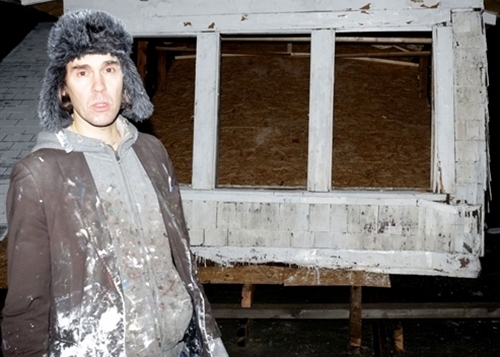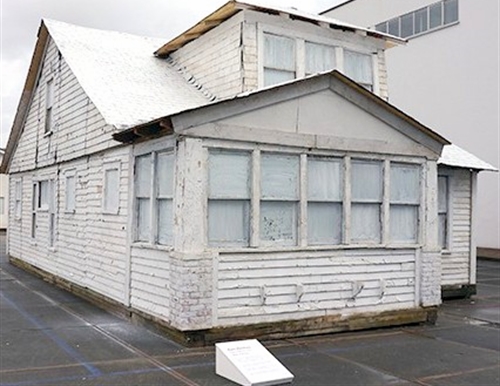Ryan Mendoza, a painter from New York who lives in Berlin, discussed his relocation of a Detroit home in phone interviews last month with Deadline. Here's a summary of a critical perspective published this month in an online arts journal.
Taylor Renee Aldridge, programs director at the N'Namdi Center for Contemporary Art in Detroit, pushes back against "stories told about the city through a narrowed voice and perspective."

Ryan Mendoza on Stoepel Street during 2015 deconstruction. (Photo by Fabia Mendoza)
In Arts.Black, a journal of art criticism from black perspectives that she co-edits, Aldridge targets Ryan Mendoza -- "a storyteller of sorts and an artist who has benefited from Detroit’s vibrant art community."
Living and working between Berlin and Naples, Mendoza recently came to Detroit to take something that does not belong to him and use it for his own benefit. Simply put, Mendoza mutilated a house on 20194 Stoepel St. . . . The house was situated in a once-active neighborhood on Detroit’s northwest side.
With the support of [three friends], he exported the home to Rotterdam [in the Netherlands] and painted it all white. The house will be exhibited and auctioned at the Verbeke Foundation in April. . . .
While Mendoza acknowledges the prior use of the home somewhat, sharing a bit about the Thomas family who lived in the house before losing it to the Detroit City Land Bank, he does so only in an effort to recenter his own narrative and motivations for using the house.
“I wanted the house to be white. I had to protect the memories and cover up the ruin porn. I had to protect the gaze of the porn-mining onlookers,” he said [in The Guardian newspaper].
I’m not sure why white is the color that would solve this issue. I presume whiteness is right in the eyes of Mendoza.
If Mendoza wants to preserve the memories and the tragic end that forced the Thomas family out of the home, Mendoza should do that. Not through controlling the onlooker's gaze by recentering white male-perspective, a view that is beyond over-saturated in the art historical cannon, but rather amplifying the voices of the Thomas family and many others who were forced of out their homes as a result of the the mortgage crisis.
The contemporary art world does not gain anything from this linear perspective. Mendoza’s actions are actually worse than ruin porn. Instead of spotlighting a fragment of Detroit through topical images like most ruin pornographers, he exploits a narrative that does not belong to him through the physical manipulation of an artifact. . . .
Mendoza’s goal was to take a blighted property in Detroit, turn it into a work of art whereby “people in Detroit could be proud” of the repurposed structure.
My question is how can Detroiters experience this new transformed art object and develop a sense of pride around it when they have no access to the final product? This effort might have been somewhat successful if the repurposed structure was available on view in the city in which it was first built.

Taylor Renee Aldridge: "He exploits a narrative that does not belong to him." (LinkedIn photo)
Aldridge, a Howard University graduate who last year earned a Harvard University master's degree in museum studies, sees the "Detroit House" saga as a fresh example of "the narrative of a helpless Detroit in need of saving."
Often times, people come to Detroit under the guise of restoration and development. As a Detroiter, the feeling is indescribable. You feel like someone has taken something from you.
This theft has happened so discreetly and seamlessly that you’re not sure if the absence of this thing is of benefit to you or not. . . . You go through a tumult of emotions: relief, sadness, confusion, frustration.
In the end, your stuff has become a commodity at someone else's gain. This thing, your stuff, that was once yours, your entire home, a part of your home, is now in the hands of someone else. Someone who is maybe more qualified, or just has more resources than you, who can maybe do your story “justice.” I mean he saved it from demolition right? The building is just ruin porn, it’s not being used anyway, right?
This person tells a story about your stuff as if it were his own. He mentions you, but you're just a small factor in the grand narrative. He takes your stuff to a place to which you are unable to travel. He said he would tell your story. Your stuff is in a gallery to be sold.

The "Detroit House" display home at last month's Art Rotterdam fair in the Netherlands. (Photo by Livingstone Gallery)
In contrast to that approach, the local gallery executive notes, "there are many organizations in Detroit that are mobilizing to rectify and reconstruct vacant properties and activate neighborhoods that have experienced systemic forms of neglect. . . . There are creators in Detroit who are tackling the issue of blight and community development without exploitation."
The sensitivity of Mendoza's project is acknowledged in a German site's recent article about his full-size outdoor installation (right) at the 17th Art Rotterdam fair. Alison Hugill writes at Berlin Art Link:
The embedded politics of the house may be fraught with class and race tensions, but the white paint and white cubes of the fair had an eerily neutralizing and depoliticizing effect.
At Arts.Black, Aldridge concludes with an appeal to the creative community:
As architects, urban designers and artists continue to come to Detroit and use the blighted landscape as a space for experimentation, I urge you to consider the lives that have been lived here. The trauma experienced in these lives. Loss of homes, jobs, and other prized possessions.
Consider these narratives as you aim to locate remedies for innovation. We, as Detroiters, welcome change -- but not at the expense of exploiting our own narratives and spaces for your personal gain.
Earlier coverage:
A Magical Tale of a Vacant Detroit House That Vanished and Ends Up in Europe, Feb. 24


 by
by








